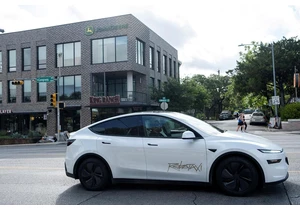The Detroit Police Department has to adopt new rules curbing its reliance on facial recognition technology after the city reached a settlement this week with Robert Williams, a Black man who was wrongfully arrested in 2020 due to a false face match. It’s not an all-out ban on the technology, though, and the court’s jurisdiction to enforce the agreement only extends four years. Under the new restrictions, which the ACLU is calling the strongest such policies for law enforcement in the country, police cannot make arrests based solely on facial recognition results or conduct a lineup based only on facial recognition leads.
Williams was arrested after facial recognition technology flagged his expired driver’s license photo as a possible match for the identity of an alleged shoplifter, which police then used to construct a photo lineup. He was arrested at his home, in front of his family, which he says “completely upended my life.” Detroit PD is known to have made at least two other wrongful arrests based on the results of facial recognition technology (FRT), and in both cases, the victims were Black, the ACLU noted in its announcement of the settlement. Studies have shown that facial recognition is more likely to misidentify people of color.
The new rules stipulate that “[a]n FRT lead, combined with a lineup identification, may never be a sufficient basis for seeking an arrest warrant,” according to a summary of the agreement. There must also be “further independent and reliable evidence linking a suspect to a crime.” Police in Detroit will have to undergo training on the technology that addresses the racial bias in its accuracy rates, and all cases going back to 2017 in which facial recognition was used to obtain an arrest warrant will be audited.
In an op-ed for TIME published today, Williams wrote that the agreement means, essentially, that “DPD can no longer substitute facial recognition for basic investigative police work.”
This article originally appeared on Engadget at https://www.engadget.com/detroit-police-can-no-longer-use-facial-recognition-results-as-the-sole-basis-for-arrests-204454537.html?src=rss https://www.engadget.com/detroit-police-can-no-longer-use-facial-recognition-results-as-the-sole-basis-for-arrests-204454537.html?src=rssInicia sesión para agregar comentarios
Otros mensajes en este grupo.

Xbox was well on its way to delivering a sci-fi stylized game with plenty of exciting movement mechanics before an abrupt change of heart. The upcoming third-person shooter RPG codenamed Blackbird

Big ticket items like TVs and iPads might get the lion’s share of the attention during Amazon’s big sale, but there are plenty of Prime Day deals to be had for under $50, too. We’ve combed through

If you've been itching to invest in a robot vacuum to help you clean up around the house, you're in luck. Prime Day deals, like clockwork, have brought discounts to a bunch of our favorite robot va

So you need a new laptop — you’ve waited for the right time. Amazon Prime Day 2025, as has been in years past, offe



